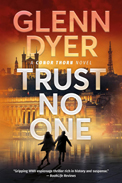
 |
After following their consciences instead of their mission parameters, Conor Thorn and his wife, Emily, have each been fired by the Allied powers for whom they worked. However, an opportunity presents itself that would allow the two agents to get back in the field and, if successful, be reinstated. An assassination of a French Admiral has many wondering if the Allies had a hand in his death. This would cause a lot of distrust between the Allies and those working with the French Resistance. In addition, it would simply be a bad look for the possible Allied agencies involved. Emily and Conor, no longer employed by any of the agencies involved, are the perfect operatives to search for the rumored information revealing the assassins and their support. However, there are also powerful SS groups interested in the information, Frenchmen loyal to the occupying Nazis, a murderer, and a man who lost his eye and ear to Conor on a previous mission.
Spy stories come in many varieties. Some enlist the aid of ordinary, completely untrained individuals who find themselves making tough decisions in situations they never would have thought to be in. This can be a seamstress, chef, or doctor suddenly caught in a dangerous world of espionage. For example, Daniel Silva’s The Unlikely Spy told the story of a history professor tasked by Churchill to find a dangerous traitor. Other spy stories are the stuff of legends. There are few people who are not familiar with Ian Fleming’s extraordinarily adept and rakish James Bond. Dyer, much like Fleming, makes his spies professional. Dyer’s lead is an American from the Navy who finds himself pulled into espionage work and likes it. W.E.B. Griffin takes a similar soldier, a U.S. Marine named Cletus Frade, and turns his WWII exploits into the Honor Bound series. These authors use professional soldiers with plenty of contacts and resources to pull off their jobs. Additionally, their books incorporate much of what a reader will find in a thriller and adventure story and combine it with a few parts of drama. Typically, there is an antagonist who is cruel, smart, and sadistic and who has a grudge against the protagonist. The heroes must beat a few waves of increasingly competent lackeys with their physical prowess and somehow outsmart the antagonist, who seems to hold all the cards.
This is the fourth book in Dyer’s Conor Thorn series, and the characters have developed relationships, good and ill, throughout the first three novels. The main protagonists have gotten married, and they have made enemies along the way. Dyer’s writing is clear, and the research he has done, which he uses to frame the book, is excellent. Not only did Dyer do enough research that his knowledge comes through, but he also knows not to overwhelm the reader by showing off too much. This produces a balance with which many writers of historical fiction struggle greatly. Dyer’s professionalism and writing experience show. The overall effectiveness of the novel would have been enhanced, though, through some additional character development and an increase in tension throughout the narrative. Still, readers who enjoy the genre will feel completely at ease with Dyer’s book, welcoming it as another enjoyable addition to the canon.